- Home
- Ernest Hemingway
Across the River and Into the Trees Page 7
Across the River and Into the Trees Read online
Page 7
A little spit ran out of the corner of his mouth as he spoke, peeringly, with the elderly, wholesome looking woman who was with him. She looks like anybody�s mother in an illustration in �The Ladies� Home Journal,� the Colonel thought. �The Ladies� Home Journal� was one of the magazines received regularly at the Officer�s Club in Trieste and the Colonel looked through it when it came. It is a wonderful magazine, he thought, because it combines sexology and beautiful foods. It makes me hungry both ways.
But who do you suppose that character is? He looks like a caricature of an American who has been run one half way through a meat chopper and then been boiled, slightly, in oil. I�m not being so gentle, he thought.
Ettore, with his emaciated face, and his love of joking and fundamental and abiding disrespect, came over and the Colonel said, �Who is that spiritual character?�
Ettore shook his head.
The man was short and dark with glossy black hair that did not seem to go with his strange face. He looked, the Colonel thought, as though he had forgotten to change his wig as he grew older. Has a wonderful face though, the Colonel thought. Looks like some of the hills around Verdun. I don�t suppose he could be Goebbels and he picked up that face in the last days when they were all playing at G�tterd�mmerung. Komm� S�sser Tod, he thought. Well they sure bought themselves a nice big piece of S�sser Tod at the end.
�You don�t want a nice S�sser Tod sandwich do you Miss Renata?�
�I don�t think so,� the girl said. �Though I love Bach and I am sure Cipriani could make one.�
�I was not talking against Bach,� the Colonel said.
�I know it.�
�Hell,� the Colonel said. �Bach was practically a co-belligerent. As you were,� he added.
�I don�t think we have to talk against me.�
�Daughter,� the Colonel said. �When will you learn that I might joke against you because I love you?�
�Now,� she said. �I�ve learned it. But you know it�s fun not to joke too rough.�
�Good. I�ve learned it.�
�How often do you think of me during the week?�
�All of the time.�
�No. Tell me truly.�
�All of the time. Truly.�
�Do you think it is this bad for everyone?�
�I wouldn�t know,� the Colonel said. �That�s one of the things I would not know.�
�I hope it�s not this bad for everyone. I had no idea it could be this bad.�
�Well you know now.�
�Yes,� the girl said. �I know now. I know now and for keeps and for always. Is that the correct way to say it?�
�I know now is enough,� the Colonel said. �Ettore, that character with the inspiring face and the nice looking woman with him doesn�t live at the Gritti does he?�
�No,� Ettore said. �He lives next door but he goes to the Gritti sometimes to eat.�
�Good,� the Colonel said. �It will be wonderful to see him if I should ever be down hearted. Who is the woman with him? His wife? His mother? His daughter?�
�There you have me,� Ettore said. �We haven�t kept track of him in Venice. He has aroused neither love, hate, dislike, fear nor suspicion. Do you really want to know anything about him? I could ask Cipriani.�
�Let us skip him,� the girl said. �Is that how you say it?�
�Let�s skip him,� the Colonel said.
�When we have so little time, Richard. He is rather a waste of time.�
�I was looking at him as at a drawing by Goya. Faces are pictures too.�
�Look at mine and I will look at yours. Please skip the man. He didn�t come here to do anyone any harm.�
�Let me look at your face and you not look at mine.�
�No,� she said. �That�s not fair. I have to remember yours all week.�
�And what do I do?� the Colonel asked her.
Ettore came over, unable to avoid conspiracy and, having gathered his intelligence rapidly and as a Venetian should, said,
�My colleague who works at his hotel, says that he drinks three or four highballs, and then writes vastly and fluently far into the night.�
�I dare say that makes marvelous reading.�
�I dare say,� Ettore said. �But it was hardly the method of Dante.�
�Dante was another vieux con,� the Colonel said. �I mean as a man. Not as a writer.�
�I agree,� Ettore said. �I think you will find no one, outside of Firenze, who has studied his life who would not agree.�
�Eff Florence,� the Colonel said.
�A difficult maneuver,� Ettore said. �Many have attempted it but very few have succeeded. Why do you dislike it, my Colonel?�
�Too complicated to explain. But it was the depot,� he said deposito, �of my old regiment when I was a boy.�
�That I can understand. I have my own reasons for disliking it too. You know a good town?�
�Yes,� said the Colonel. �This one. A part of Milano; and Bologna. And Bergamo.�
�Cipriani has a large store of vodka in case the Russians should come,� Ettore said, loving to joke rough.
�They�ll bring their own vodka, duty free.�
�Still I believe Cipriani is prepared for them.�
�Then he is the only man who is,� the Colonel said.
�Tell him not to take any checks from junior officers on the Bank of Odessa, and thank you for the data on my compatriot. I won�t take more of your time.�
Ettore left and the girl turned toward him, and looked in his old steel eyes and put both her hands on his bad one and said, �You were quite gentle.�
�And you are most beautiful and I love you.�
�It�s nice to hear it anyway.�
�What are we going to do about dinner?�
�I will have to call my home and find out if I can come out.�
�Why do you look sad now?�
�Do I?�
�Yes.�
�I am not, really. I am as happy as I ever am. Truly. Please believe me, Richard. But how would you like to be a girl nineteen years old in love with a man over fifty years old that you knew was going to die?�
�You put it a little bluntly,� the Colonel said. �But you are very beautiful when you say it.�
�I never cry,� the girl said. �Never. I made a rule not to. But I would cry now.�
�Don�t cry,� the Colonel said. �I�m gentle now and the hell with the rest of it.�
�Say once again that you love me.�
�I love you and I love you and I love you.�
�Will you do your best not to die?�
�Yes.�
�What did the doctor say?�
�So-so.�
�Not worse?�
�No,� he lied.
�Then let us have another Martini,� the girl said. �You know I never drank a Martini until we met.�
�I know. But you drink them awfully well.�
�Shouldn�t you take the medicine?�
�Yes,� the Colonel said. �I should take the medicine.�
�May I give it to you?�
�Yes,� the Colonel said. �You may give it to me.�
They continued to sit at the table in the corner and some people went out, and others came in. The Colonel felt a little dizzy from the medicine and he let it ride. That�s the way it always is, he thought. To hell with it.
He saw the girl watching him and he smiled at her. It was an old smile that he had been using for fifty years, ever since he first smiled, and it was still as sound as your grandfather�s Purdey shot-gun. I guess my older brother has that, he thought. Well, he could always shoot better than I could and he deserves it.
�Listen, daughter,� he said. �Don�t be sorry for me.�
�I�m not. Not at all. I just love you.�
�It isn�t much of a trade is it?� He said oficio instead of trade, because they spoke Spanish together too, when they left French, and when they did not wish to speak English before other people. Spanish is a rough language, the Colonel thought, roughe
r than a corncob sometimes. But you can say what you mean in it and make it stick.
�Es un oficio bastante malo,� he repeated, �loving me.�
�Yes. But it is the only one I have.�
�Don�t you write any more poetry?�
�It was young girl poetry. Like young girl painting. Everyone is talented at a certain age.�
At what age do you become old in this country, the Colonel thought. No one is ever old in Venice, but they grow up very fast. I grew up very rapidly in the Veneto myself, and I was never as old as I was at twenty-one.
�How is your mother?� he asked, lovingly.
�She is very well. She does not receive and she sees almost no one because of her sorrow.�
�Do you think she would mind if we had a baby?�
�I don�t know. She is very intelligent, you know. But I would have to marry someone, I suppose. I don�t really want to.�
�We could be married.�
�No,� she said. �I thought it over, and I thought we should not. It is just a decision as the one about crying.�
�Maybe you make wrong decisions. Christ knows I�ve made a few and too many men are dead from when I was wrong.�
�I think, perhaps, you exaggerate. I don�t believe you made many wrong decisions.�
�Not many,� the Colonel said. �But enough. Three is plenty in my trade, and I made all three.�
�I�d like to know about them.�
�They�d bore you,� the Colonel told her. �They beat the hell out of me to remember them. So what would they do to some outsider?�
�Am I an outsider?�
�No. You�re my true love. My last and only and true love.�
�Did you make them early or late? The decisions.�
�I made them early. In the middle. And late.�
�Wouldn�t you tell me about them? I would like to have a share in your sad trade.�
�The hell with them,� the Colonel said. �They were made and they�ve all been paid for. Only you can�t pay for that.�
�Can you tell me about that and why?�
�No,� the Colonel said. And that was the end of that.
�Then let�s have fun.�
�Let�s,� the Colonel said. �With our one and only life.�
�Maybe there are others. Other lives.�
�I don�t think so,� the Colonel said. �Turn your head sideways, beauty.�
�Like this?�
�Like that,� the Colonel said. �Exactly like that.�
So, the Colonel thought, here we come into the last round and I do not know even the number of the round. I have loved but three women and have lost them thrice.
You lose them the same way you lose a battalion; by errors of judgment; orders that are impossible to fulfill, and through impossible conditions. Also through brutality.
I have lost three battalions in my life and three women and now I have a fourth, and loveliest, and where the hell does it end?
You tell me, General, and, incidentally, while we are discussing the matter, and it is a frank discussion of the situation and in no sense a Council of War, as you have so often pointed out to me General: GENERAL WHERE IS YOUR CAVALRY?
I have thought so, he said to himself. The Commanding Officer does not know where his cavalry is, and his cavalry are not completely accurate as to their situation, nor their mission, and they will, some of them, enough, muck off as cavalry have always mucked off in all the wars since they, the Cavalry, had the big horses.
�Beauty,� he said, �Ma tr�s ch�re et bien aim�e. I am very dull and I am sorry.�
�You are never dull, to me, and I love you and I only wish we could be cheerful tonight.�
�We damn well will be,� said the Colonel. �Do you know anything particular we should be cheerful about?�
�We might be cheerful about us, and about the town. You�ve often been very cheerful.�
�Yes,� the Colonel agreed. �I have been.�
�Don�t you think we could do it once more?�
�Sure. Of course. Why not?�
�Do you see the boy with the wave in his hair, that is natural, and he only pushes it a little, skillfully, to be more handsome?�
�I see him,� the Colonel said.
�He is a very good painter, but he has false teeth in front because he was a little bit p�d�raste once and other p�d�rastes attacked him one night on the Lido when there was a full moon.�
�How old are you?�
�I will be nineteen.�
�How do you know this?�
�I know it from the Gondoliere. This boy is a very good painter, for now. There aren�t any really good painters now. But with false teeth, now, in his twenty-fifth year, what a thing.�
�I love you very truly,� the Colonel said.
�I love you very truly, too. Whatever that means in American. I also love you in Italian, against all my judgment and all of my wishes.�
�We shouldn�t wish for too God-damn much,� the Colonel said. �Because we are always liable to get it.�
�I agree,� she said. �But I would like to get what I wish for now.�
Neither of them said anything and then the girl said, �That boy, he is a man now, of course, and goes with very many women to hide what he is, painted my portrait once. You can have it if you like.�
�Thank you,� the Colonel said. �I would love it.�
�It is very romantic. My hair is twice as long as it has ever been and I look as though I were rising from the sea without the head wet. Actually, you rise from the sea with the hair very flat and coming to points at the end. It is almost the look of a very nearly dead rat. But Daddy paid him adequately for the portrait, and, while it is not truly me, it is the way you like to think of me.�
�I think of you when you come from the sea too.�
�Of course. Very ugly. But you might like to have this portrait for a souvenir.�
�Your lovely mother would not mind?�
�Mummy would not mind. She would be glad to be rid of it, I think. We have better pictures in the house.�
�I love you and your mother both very much.�
�I must tell her,� the girl said.
�Do you think that pock-marked jerk is really a writer?�
�Yes. If Ettore says so. He loves to joke but he does not lie. Richard, what is a jerk? Tell me truly.�
�It is a little rough to state. But I think it means a man who has never worked at his trade (oficio) truly, and is presumptuous in some annoying way.�
�I must learn to use the term properly.�
�Don�t use it,� the Colonel said.
Then the Colonel asked, �When do I get the portrait?�
�Tonight if you wish it. I�ll have someone wrap it and send it from the house. Where will you hang it?�
�In my quarters.�
�And no one will come in and make remarks and speak badly of me?�
�No. They damn well will not. Also I�ll tell them it is a portrait of my daughter.�
�Did you ever have a daughter?�
�No. I always wanted one.�
�I can be your daughter as well as everything else.�
�That would be incest.�
�I don�t think that would be so terrible in a city as old as this and that has seen what this city has seen.�
�Listen, Daughter.�
�Good,� she said. �That was fine. I liked it.�
�All right,� the Colonel said and his voice was thickened a little. �I liked it, too.�
�Do you see now why I love you when I know better than to do it?�
�Look, Daughter. Where should we dine?�
�Wherever you like.�
�Would you eat at the Gritti?�
�Of course.�
�Then call the house and ask for permission.�
�No. I decided not to ask permission but to send word where I was dining. So they would not worry.�
�But do you really prefer the Gritti?�
&nbs
p; �I do. Because it is a lovely restaurant and it is where you live and anyone can look at us that wants to.�
�When did you get like that?�
�I have always been like that. I have never cared what anyone thought, ever. Nor have I ever done anything that I was ashamed of except tell lies when I was a little girl and be unkind to people.�
�I wish we could be married and have five sons,� the Colonel said.
�So do I,� the girl said. �And send them to the five corners of the world.�
�Are there five corners to the world?�
�I don�t know,� she said. �It sounded as though there were when I said it. And now we are having fun again, aren�t we?�
�Yes, Daughter,� the Colonel said.
�Say it again. Just as you said it.�
�Yes, Daughter.�
�Oh,� she said. �People must be very complicated. Please may I take your hand?�
�It�s so damned ugly and I dislike looking at it.�
�You don�t know about your hand.�
�That�s a matter of opinion,� he said. �I�d say you were wrong, Daughter.�
�Maybe I am wrong. But we�re having fun again and whatever the bad thing was is gone now.�
�It�s gone the way the mist is burned off the hollows in broken ground when the sun comes out,� the Colonel said. �And you�re the sun.�
�I want to be the moon, too.�
�You are,� the Colonel told her. �Also any particular planet that you wish to be and I will give you an accurate location of the planet. Christ, Daughter, you can be a God-damn constellation if you like. Only that�s an airplane.�
�I�ll be the moon. She has many troubles too.�
�Yes. Her sorrows come regularly. But she always fills before she wanes.�
�She looks so sad to me sometimes across the Canal that I cannot stand it.�
�She�s been around a long time,� the Colonel said.
�Do you think we should have one more Montgomery?� the girl asked and the Colonel noticed that the British were gone.
He had been noticing nothing but her lovely face. I�ll get killed sometime that way, he thought. On the other hand it is a form of concentration, I suppose. But it is damned careless.
�Yes,� he said. �Why not?�
�They make me feel very good,� the girl said. �They have a certain effect on me, too, the way Cipriani makes them.�
�Cipriani is very intelligent.�
�He�s more than that. He�s able.�
�Some day he�ll own all Venice.�
�Not quite all,� the Colonel disagreed. �He�ll never own you.�
�No,� she said. �Nor will anyone else unless you want me.�
�I want you Daughter. But I don�t want to own you.�
�I know it,� the girl said. �And that�s one more reason why I love you.�
�Let�s get Ettore and have him call up your house. You can tell them about the portrait.�
�You are quite correct. If you want the portrait tonight, I must speak to the butler to have it wrapped and sent. I will also ask to speak to Mummy and tell her where we are dining and, if you like, I will ask her permission.�
�No,� the Colonel said. �Ettore, two Montgomerys, super Montgomerys, with garlic olives, not the big ones, and please call the home of this lady and let her know when you have completed the communication. And all of this as rapidly as possible.�
�Yes, my Colonel.�
�Now, Daughter, let us resume the having of the fun.�
�It was resumed when you spoke,� she said.
CHAPTER X
THEY were walking, now, along the right side of the street that led to the Gritti. The wind was at their backs and it blew the girl�s hair forward. The wind parted her hair in the back and blew it forward about her face. They were looking in the shop windows and the girl stopped in front of the lighted window of a jewelry shop.

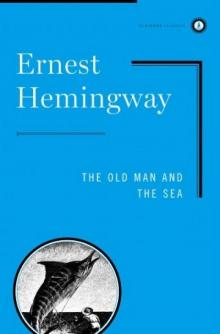 The Old Man and the Sea
The Old Man and the Sea Green Hills of Africa
Green Hills of Africa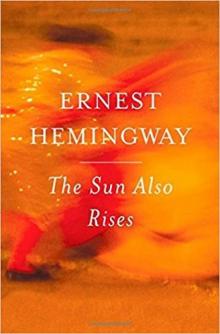 The Sun Also Rises
The Sun Also Rises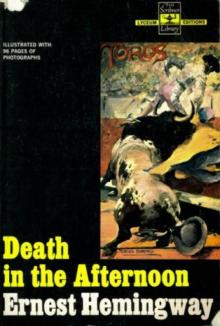 Death in the Afternoon
Death in the Afternoon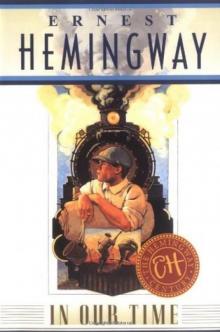 In Our Time
In Our Time For Whom the Bell Tolls
For Whom the Bell Tolls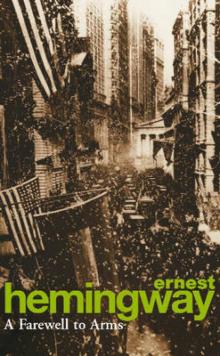 A Farewell to Arms
A Farewell to Arms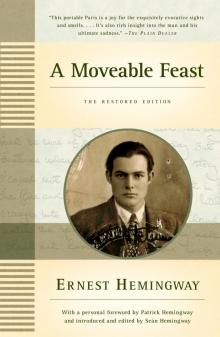 A Moveable Feast
A Moveable Feast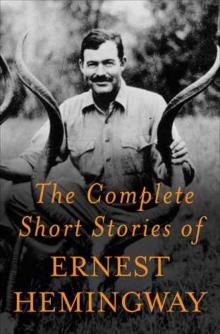 The Complete Short Stories of Ernest Hemingway
The Complete Short Stories of Ernest Hemingway Big Two-Hearted River
Big Two-Hearted River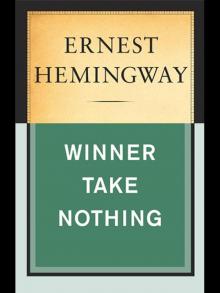 Winner Take Nothing
Winner Take Nothing Islands in the Stream
Islands in the Stream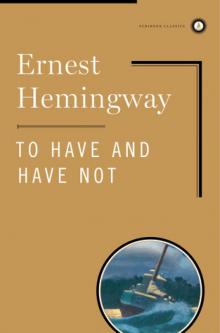 To Have and Have Not
To Have and Have Not The Snows of Kilimanjaro and Other Stories
The Snows of Kilimanjaro and Other Stories Across the River and Into the Trees
Across the River and Into the Trees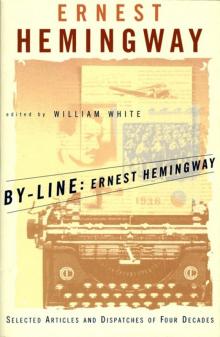 By-Line Ernest Hemingway
By-Line Ernest Hemingway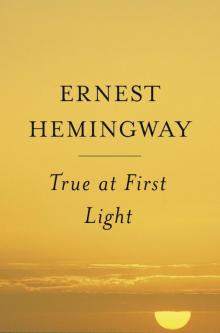 True at First Light
True at First Light Men Without Women
Men Without Women The Nick Adams Stories
The Nick Adams Stories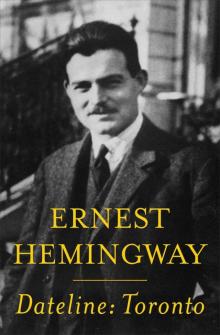 Dateline- Toronto
Dateline- Toronto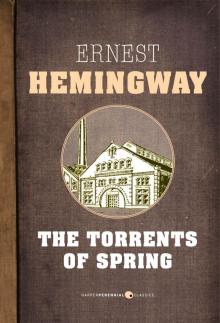 The Torrents of Spring
The Torrents of Spring Short Stories
Short Stories